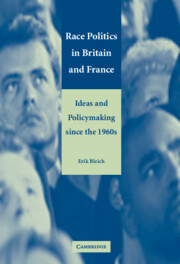Book contents
- Frontmatter
- Contents
- Preface and Acknowledgments
- Abbreviations and Acronyms
- Introduction
- 1 Perspectives on Comparative Public Policymaking: The Place of Frames
- 2 The Birth of British Race Institutions: 1945 to the 1965 Race Relations Act
- 3 Round Two: 1965 to the 1968 Race Relations Act
- 4 From 1968 to the 1976 Race Relations Act and Beyond
- 5 The Origins of French Antiracism Institutions: 1945 to the 1972 Law
- 6 The Struggle Continued: Antiracism from 1972 to the 1990 Gayssot Law and Beyond
- 7 Race Frames and Race Policymaking in Britain and France
- 8 Race, Racism, and Integration in Europe: Recent Developments, Options, and Trade-offs
- References
- Index
Preface and Acknowledgments
Published online by Cambridge University Press: 26 December 2009
- Frontmatter
- Contents
- Preface and Acknowledgments
- Abbreviations and Acronyms
- Introduction
- 1 Perspectives on Comparative Public Policymaking: The Place of Frames
- 2 The Birth of British Race Institutions: 1945 to the 1965 Race Relations Act
- 3 Round Two: 1965 to the 1968 Race Relations Act
- 4 From 1968 to the 1976 Race Relations Act and Beyond
- 5 The Origins of French Antiracism Institutions: 1945 to the 1972 Law
- 6 The Struggle Continued: Antiracism from 1972 to the 1990 Gayssot Law and Beyond
- 7 Race Frames and Race Policymaking in Britain and France
- 8 Race, Racism, and Integration in Europe: Recent Developments, Options, and Trade-offs
- References
- Index
Summary
Writing on race is no easy task because the term has no clear meaning. What are, for example, the boundaries that distinguish one “race” from another? Given that there are no biological bases for deciding whether there is such a thing as the “Irish race,” the “Jewish race,” or the “black race,” perhaps it is better to avoid such a loaded term altogether. And if the word is so ambiguous, controversial, or counterproductive, what purpose is served by devoting a book to the subject of “race politics” and “race policies”?
The topic of race arrived brusquely on my agenda when I was wrongfully arrested in December 1995 in Brixton, South London, during what was characterized by some as a race riot. My one phone call after a long night in jail was to a friend who, instead of recommending a lawyer, put me in touch with a journalist. Very early in our discussion, the reporter said that she hated to ask this, but was I by any chance black? One year later, while conducting interviews in Paris, a learned scholar stopped me short upon entering her office: What ethnicity was I, that I was writing a book on race?
Race is certainly an ambiguous word. It is a problematic concept that must be investigated rather than simply accepted. Yet, it remains incredibly meaningful.
- Type
- Chapter
- Information
- Race Politics in Britain and FranceIdeas and Policymaking since the 1960s, pp. vii - xPublisher: Cambridge University PressPrint publication year: 2003

